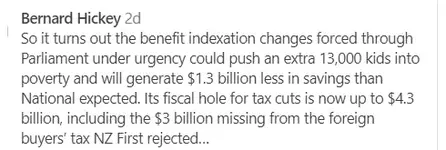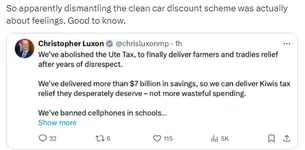For those who have lived through this ad nauseum in the last 45 years, and those that haven't or weren't aware, here's the pattern to privatisation - softening, sell, socialise the cost, privatise the profit:
1. Claim that there are roadblocks, regulatory or otherwise and that the country is being held back or:
1a: From out of nowhere come up with reports to say that everything is broken and can't be sustained (reports are often based on consultants hired by the political party that produces them)
2: Also, miraculously, have a prepared solution that involves one of the following - must be sold, must downsize immediately and allow "competition" a fair chance, must make a fake "market" to allow competition a fair chance, must sell of large portions of it's books to gain a return regardless of social cost, must immediately start operating at a profit or else be sold etc etc. The solution will miraculously involve some kind of private enterprise ready to step into a ppp, or outright purchase to privatise, one that we find out later has been there all along
3: What doesn't get socialised is the actual social cost and whether this provides any benefit at all. But hey, as long as we move the debate right this will never get raised.
4: Never ever allow any kind of independent analysis to find out if such privatisation has ever had any benefit to the citizens of New Zealand, or wherever it takes place (hint: it doesn't)
AND HERE'S THE NEXT STEP TO PRIVATISATION IN THIS GOVERNMENT'S TERM
Sell an asset? Lose it forever. Why sell something providing benefit to our society. It's madness. Meanwhile, they're softening us up and moving the terms of debate further right.

www.thepost.co.nz
Sunday, February 18, 2024

Wellington
20°C
21°C / 15°C
Log InSubscribe
NEWSPOLITICSLIFE & CULTUREOPINIONBUSINESSSPORTPUZZLESSUNDAY STAR-TIMES
Documents reveal Kāinga Ora floated sell-off of more than 10,000 state houses
Andrea Vance
February 18, 2024
Prime Minister Christopher Luxon will deliver his first State of the Nation speech as premier on Sunday.
ROBERT KITCHIN / THE POST
Kāinga Ora was threatening to sell more than 10,000 state homes to balance its books, Prime Minister Christopher Luxon will claim in a keynote speech.
The assertion has opened up a tit-for-tat with Labour, with the Opposition suggesting the proposed fire sale was down to National’s underfunding of public housing.
But while both parties are trading blows, it looks unlikely any sale will take place.
In his first State of the Nation address as premier on Sunday, Luxon will continue to hammer the previous government for its lack of delivery and spending. That was a key theme of the party’s election campaign, and since the Cabinet was sworn in, in November.
Late last year, Housing Minister Chris Bishop launched a review of Kāinga Ora’s financial situation, procurement and asset management, citing concerns about the the agency’s debt levels. It is led by former prime minister Bill English.
Official advice suggested the debt was expected to rise to $29 billion by 2033.
On Sunday, Luxon will reveal the agency was contemplating flogging off 10,200 state homes to raise $6b. It is an assertion that is especially politically charged: housing affordability continues to be squeezed, with over 25,000 households on a waiting list as of October.
The claim is based on a December report from Treasury to Finance Minister Nicola Willis. The advice, dated December 8, said: “Kāinga Ora's borrowing is driven by investment in the public housing portfolio, which Kāinga Ora's forecast assumes will be offset by $6 billion in revenue from the sale of 10,200 public homes over the forecast period.
“These sales partially offset the new public houses built, such as that Kāinga Ora forecast no change in the size of public housing portfolio between 2025/6 and 2027/8... The Treasury does not consider this to be a reasonable assumption.”
But Labour has cried foul, saying it never sighted nor signed off on any sell-off proposal and suggested Kāinga Ora has been forced into the situation because National hasn’t committed to public housing beyond 2025.
Kieran McAnulty says National plans to underfund state housing.
ROBERT KITCHIN / THE POST
Housing spokesperson Kieran McAnulty said National wasn’t funding extra income-related rent subsidies (IRRSs). The payment allows housing providers to charge market rates for rent: tenants pay as much as they can depending on income, and the Government tops up the rest.
Those rents generate more money for social housing providers who use that to build more homes.
Chris Bishop asked Bill English to review the state housing landlord.
ROBERT KITCHIN / THE POST
Labour also pointed to its election manifesto pledge to build an extra 6,000 public and transitional homes.
“New Zealand badly needs to keep building public houses,” McAnulty said. “The Labour government delivered one in six public homes within New Zealand's entire public housing stock between 2017 and 2023, and were planning to do more. National said during the campaign they would build houses too, not sell them off and stop building.
“We have a proven record and seek reassurance from National that their poor record isn't about to be repeated.”
But Housing Minister Chris Bishop said Labour’s claim was “ludicrous”.
“Labour’s last Budget in 2023 funded IRRS places only until June 2025. National came to office and this report landed on our desks showing that the Government inherited a system where KO [Kāinga Ora] was forecasting to sell 10,200 houses under Labour’s management. It’s as simple as that.”
Gareth Stiven, Kāinga Ora’ general manager of strategy, finance and policy, said the advice was Treasury’s report.
“We have submitted to Treasury ... scenarios for the renewal and growth of our housing portfolio.”
“This includes options to continue upgrading our older houses – 45,000 over the next 10-15 years – and the number of new public homes the Government requires us to supply, which is determined as part of the Budget process.”
The asset management strategy includes redeveloping sites, demolishing older state homes and replacing them with two or three new homes.
“With our large-scale projects we also redevelop and sell surplus land, which enables more public and market homes to be delivered.”
Forecasting “shows our public housing portfolio will not reduce, while enabling the supply of more housing”, Stiven said.
Luxon will deliver his State of the Nation speech in Auckland’s Mt Wellington on Sunday morning.
- Sunday Star Times
Share
BREAKING NEWS? Send your photos, videos and tip-offs to
[email protected], or call us on 0800 697 8833
Copyright © 2024 Stuff




